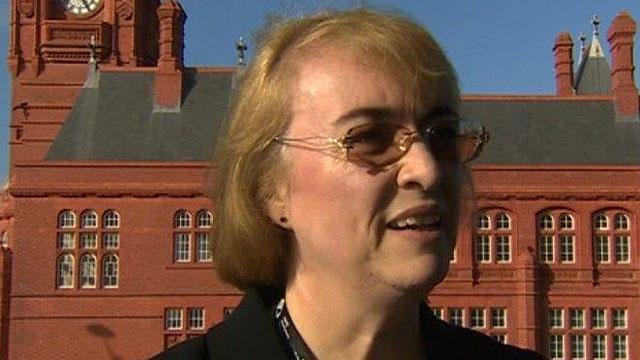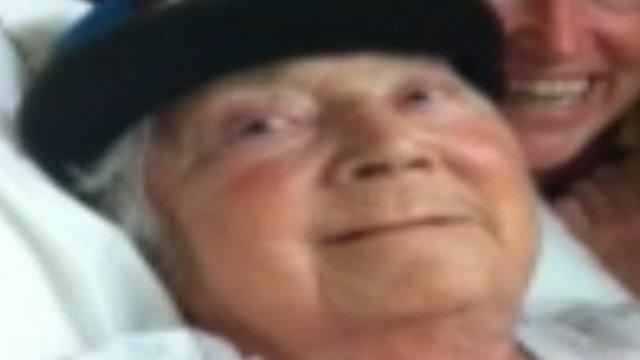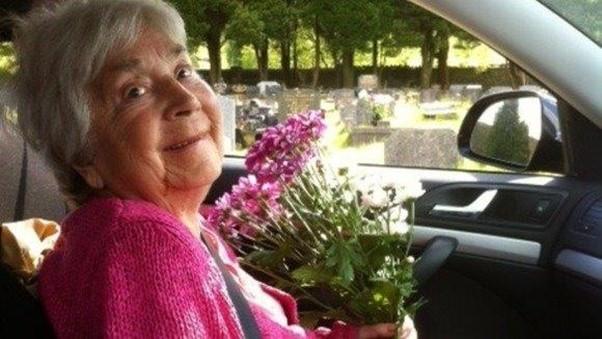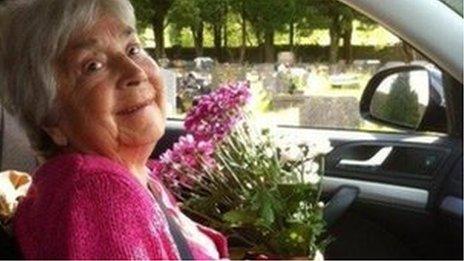Medicine management improvements call after spot checks
- Published
The Princess of Wales Hospital says it has taken on more nurses
Improvements are needed to make sure medicines are safely administered on hospital wards caring for elderly patients, according to a report.
Investigators carried out spot checks, external at 20 hospitals across Wales prompted by criticisms of elderly patient care.
They found there were aspects of management of medicines that needed to be improved "in the vast majority" of the 70 wards inspected.
They also looked at continence care, hydration and night-time sedation.
The spot checks were ordered after the publication of the Trusted To Care report, which found failings in the care of Lilian Williams, 82, at two hospitals.
The findings of Thursday's report, Learning from Trusted To Care, external, said: "Overall we found no systemic issues of concern about patient hydration, continence needs or the use of sedation.
"We did find individual areas where improvements were needed, but we also observed many examples of notable practice.
"We did however find areas for improvement with medicines management on wards throughout NHS Wales. The main issues we have found related to the safe and secure storage of medicines."
BBC Wales correspondent Hywel Griffith says there are still serious concerns over storage of medicine
A team of independent experts conducted the checks.
"We will use the findings from the spot checks to help us continue to improve the care of older people in Wales and the lessons we have learned will be shared across the Welsh NHS," he said.

Analysis: Owain Clarke, BBC Wales health correspondent
Giving the right medicines to the right patients is a key part of the work of the NHS and if mistakes happen patients can be at risk.
Today's report found there had been several errors across the Welsh NHS.
Examples include a stroke patient not being given blood thinning medicine, antibiotics being forgotten, patients identities not being checked, broken locks on cabinets and unlabelled syringes left out in the open.
But in other aspects of elderly care, such as making sure elderly patients get enough water, the report says the Welsh NHS is performing much better.
The Welsh government says lessons are being learned and the report proves most patients get good and safe care.
At the Princess of Wales Hospital in Bridgend the latest spot checks found there had been improvements but inspectors were so concerned about patient safety on one ward they decided to alert the hospital's on-call boss immediately.

The inquiry followed a BBC Wales report in July 2013 surrounding the care of 82-year-old Lilian Williams who died following three stays in hospital.
During her time as a patient, her family had raised concerns about her care at the Princess of Wales in Bridgend and Neath Port Talbot.
Mrs Williams had been admitted to both hospitals between August 2010 and November 2012, when she died.
The family complained after her first visit, saying Mrs Williams had been left with nothing to eat or drink for several days and became delirious.
They had similar concerns two years later when she was readmitted, where they raised concerns over the care of her amputated leg. There were further issues during her third and final stay in hospital later that year.
In February 2013, three months after Mrs Williams's death, managers at the two hospitals raised concerns with police over patient care and a criminal investigation got under way.
'Hopelessness'
Three nurses from the Princess of Wales Hospital were arrested in the summer of 2013 on suspicion of falsifying patient records.
In November 2013, Mr Drakeford announced a review into standards of nursing at the two hospitals involved, led by Prof June Andrews.
The resulting report, Trusted to Care, external, was published in May 2014 and found a series of failings. It described a "sense of hopelessness" in the delivery of care for its frail and elderly patients, poor professional behaviour and a lack of "suitably qualified, educated and motivated" staff.
The health board subsequently apologised, calling Mrs Williams's case "completely unacceptable". The health minister also apologised to those affected.
He also announced the spot checks of hospitals across Wales, focusing on four areas: delivery of medicine, hydration, night-time sedation and continence care.
By July 2014, a total of 15 nurses from ABMU had been suspended. Five have been charged and appeared in court, with one, Rebecca Jones, 30, from Bridgend, admitting falsifying patient notes showing blood sugar levels.
- Published16 October 2014

- Published16 October 2014

- Published16 October 2014

- Published16 October 2014

- Published13 May 2014

- Published13 May 2014

- Published25 July 2013
